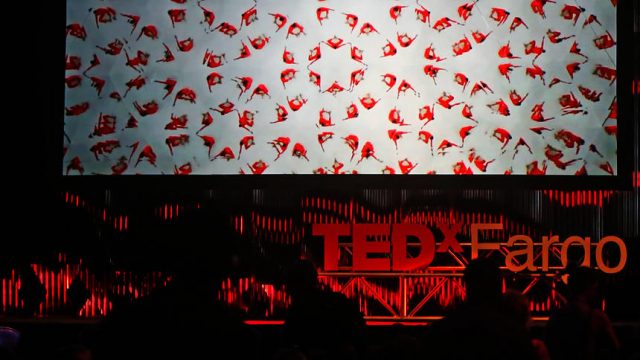John Andrist: Joy Comes From Giving

Participants arrive for the the second morning session Thursday, July 21, 2016, of the TEDx Fargo event at the Fargo Civic Center. David Samson / The Forum
Is there real, genuine joy in your life?
I’m not talking about moments of happiness or bliss. I’m thinking more about the state of being joyful.
While attending a TED-X event in Fargo last week I visited briefly with a Colorado man, who was one of the chosen speakers.
His card identifies him as an associate vice chancellor of the medical campus at the University of Colorado.
But his mission has been his long career as a professional charitable fund raiser. The technical name is development officer.
He told me the “joy” portion of our brain that lights up when we are using drugs is the same area that lights up when we make large gifts or give a large chunk of our time to other people or a cause we care about.
I spent half the day surfing the web for supporting evidence, and I read a great deal of interesting stuff about brains and brain research, which seem to support the finding.
It was easier to believe, because of my own experience and frame of reference.
Working for “good causes” has always been a satisfying, self-feeding experience.
[mks_pullquote align=”right” width=”300″ size=”24″ bg_color=”#ffffff” txt_color=”#000000″]…did you ever see a person who gave large chunks of his or her life to others who expressed regret?[/mks_pullquote]
But never did it overwhelmingly turn my crank as much as the joy I found when I started to give away significant chunks of the accumulation that was the central focus of my life of work.
I’ve seen it in others, as well. Notably volunteers. Not so much in the folks who do good church work or spend a couple hours here and there collecting money for the Community Chest. Their mission is more of a sense of payback
But did you ever see a person who gave large chunks of his or her life to others who expressed regret?
I have a granddaughter who is completing a year of mission service in Madagascar following her graduation from college. Want to measure her joy? Think her life has not been profoundly changed for the better because of it?
Or that she wasn’t influenced by what she saw in her father who spent two summers of his own young life in his college years bringing eyeglasses and vision care to Fiji Island natives?
I have another friend who bought retirement property in Latin America, then sold it for a million dollar gain. So he decided to use it to build a school for 600 disadvantaged kids. His eyes water from exquisite joy when he talks about it.
The Medora Foundation has more applicants than it can handle who want to give a week or two of their time as volunteers. I’ve never seen a sad one.
I’ve known many who have taken a few weeks to build homes for the poor through church or Habitat for Humanity programs.
Forget all those platitudes like “more blessed to give than to receive”. It only means something to those who really have done it sacrificially.
We are taught from childhood that we will be happier if we are polite, considerate, and caring. But we don’t really get it.
did you ever see a person who gave large chunks of his or her life to others who expressed regret?
How odd that most of us spend our lives trying to acquire the toys of happiness, but so rarely, if ever, discover real deep down joy comes from giving, not getting.
And yet, the giving never lights up the brain with that great sense of joy until it represents a real dollar or time commitment that is a passion, rather than a contributing share given out of a sense of responsibility.
All about TED
I had heard a lot about TED before finally deciding to go see for myself. You can find a lot about it if you Google TED
It’s a concept that has particularly strong appeal to young adults. In a single day TED chapters of volunteers bring in a large number of gifted speakers who have to condense into about 15-minutes their profound ideas in Technology, Entertainment, and Design.
That’s what the TED stands for.
In Fargo more than 1,800 shelled out a hundred bucks to attend — and called it a bargain.
Call it inspirational candy for the mind. They like the motto of “ideas worth spreading”.
The thesis for one was that loneliness is the greatest health risk in our lives. Another was on the tragedy of child sexual abuse.
Still another told us mental health is afflicting the young more than any other age group, and what we can do about it.
One related the discovery that lamenting what’s wrong never changes anything: “All change begins with works”.
Google TED for your own cafeteria of candy for the brain.




